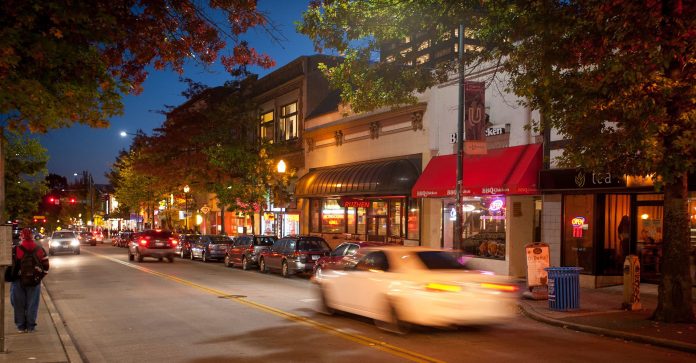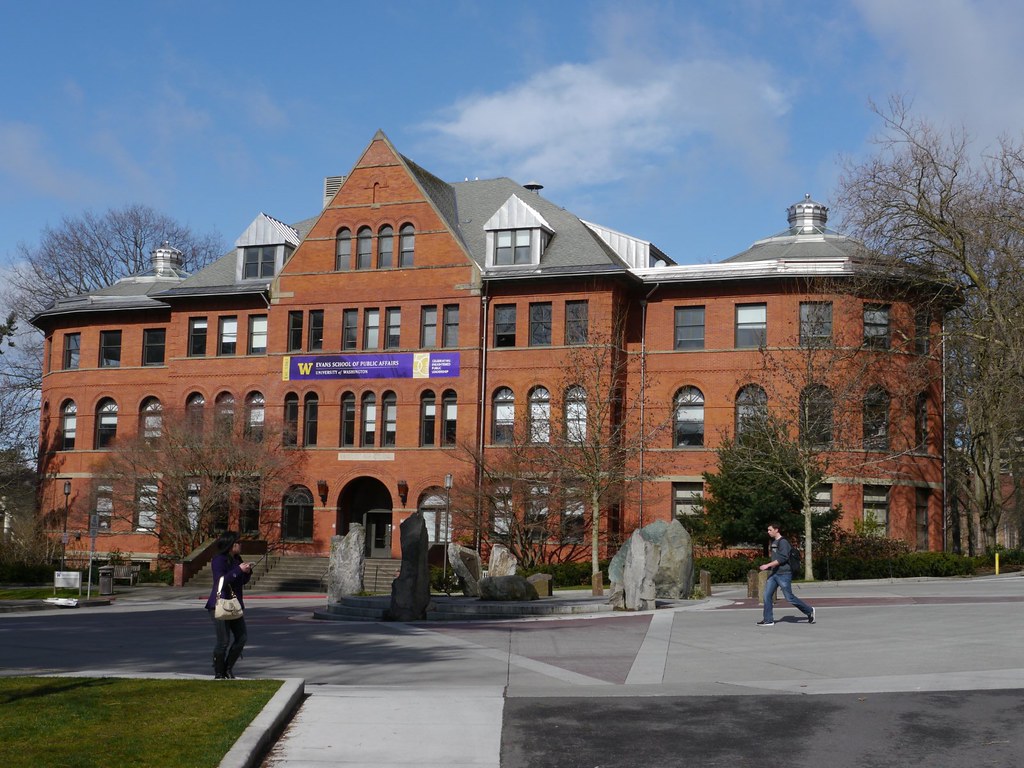
Last week, the University of Washington Graduate and Professional Student Senate voted in favor of creating an unarmed community response system for non-violent calls in the U District, the fast-growing and diverse neighborhood near the university campus. The legislation passed by an overwhelming majority (18 in favor, 3 opposed, and 2 abstaining), breathing momentum into a pilot program that could be operational in less than one year.
Leading the charge were the bill’s two sponsors: Matthew Mitnick and Davon Thomas, both first-year policy students who were negatively impacted by police interactions in Seattle. Last fall, Mitnick and Thomas were confronted with the reality of police interaction when they came across their friend’s body who had committed suicide. Police did not arrive for hours and provided no emotional or mental health support to Mitnick or Thomas. Shortly before the vote, Thomas called attention to that night, saying, “As a gay Black man, I was hyper aware of the situtation when I had to call 911 for police.”
Thomas isn’t the only one with an emotional, fear-based response to police. According to the bill’s sponsors, dozens of community organizations have expressed strong support for the initiative, but some requested that their support remain anonymous to protect themselves from retaliation by other students, university administration, or police.
Pilot program receives support from city and state leaders
Of course, not all of the bill’s supporters wish to remain so anonymous. Standing out front in visible support is Washington State Rep. Frank Chopp of the 43rd Legislative District, who attempted to secure state funding through the State Budget last week. Although funding fell through, Chopp will be meeting with students again in March, as well as Councilmember Teresa Mosqueda to advocate for the program. While Chopp plans to continue his support at the state level, he told The Urbanist that “the City of Seattle should take the lead. The state can be supportive, but this really should be a City of Seattle priority.”
One city-level advocate includes Councilmember Andrew Lewis (District 7), who has also come out strongly in favor of the initiative. Highlighting gaps in police service due to hiring bottlenecks and logistic hurdles, Lewis told the Urbanist that “increasingly this is something we have to do. If we stubbornly insist on making the police do everything that requires an emergency response… then we will be in massive trouble. The cities that are going to be most successful are the ones diversifying their response systems.” In conversations with students, Lewis stated he will work to secure funding through the city budget next year. Cautiously optimistic about the political appetite for the initiative, Lewis said, “it’s too early to say what direction the Harrell Administration is going, but we’ve certainly heard a lot of public statements of support for low-acuity response alternatives.”

For the immediate future, funding will likely be provided by the University of Washington, although University Administration remains neutral. The morning of the vote, Dean Jodi Sandfort of the Evans School of Public Policy and Governance told The Urbanist that securing a passing student vote was “essential” for demonstrating real commitment from students, commitment she believes is necessary for the initiative to get off the ground.
While Sandfort views herself as a student supporter generally, she feels that “student leaders came with a solution in their minds, but hadn’t consulted those most impacted by emergency services in the area.” The Dean continues to be adamant about including community voices in the program design phase, pushing for the Evans Policy Innovation Collaborative (EPIC) to shepherd the design process.
Ramping up an equitable design process
Now that the vote has passed, the bill’s sponsor and student advocate looks forward to the design process.
“I’m always skeptical of university involvement, but I’ve been really pleasantly surprised by Dean Standfort,” Mitnick said. “She’s expressed strong interest in community support and feedback. Tomorrow when we receive the proposal, we should see in writing that the community and students are equal partners in this work.”
The program design process will start on May 1st — less than two months away. Participants will include students, professors, policymakers, and community leaders in the U District. All participants will be compensated for their time, a priority for the student advocates and a recent practice in creating equitable task forces and committees.
“This is an opportunity for the community and students to design a program that they themselves will interact with,” Mitnick added. “It’s important these teams represent the community, especially those that have disproportionate interaction with emergency response, and those with lived experience. That’s why the compensation piece is so important.”
It does seem that not all members of the Student Senate are in such strong support of the initiative. Before the GPSS vote, one senator stood in strong opposition to the legislation, saying that “the bill’s sponsors have not done enough to meet our community-engagement criteria.”
The students have also not attempted to engage the UW Police Department or Seattle Police Department. Last year, working in Madison, Wisconsin to create a similar initiative called CARES, Mitnick said the police department was hostile and constantly creating roadblocks. He feels confident that the police in Seattle would present similar challenges.
Questions surround response from Mayor Harrell
A final major unknown will be Mayor Harrell’s administration. While the Mayor has publicly expressed interest in creating an unarmed third public safety department, he has also called for increases to SPD personnel and hot spot policing. Previous attempts to create police alternatives have not been successful in Seattle. Instead, previous Mayor Jenny Durkan implemented co-response models and diversion programs, which can reduce police roles but does not provide unarmed alternatives. The City also does not currently provide specific responses for nonviolent 9-1-1 calls, something that the students argue is unique about their initiative.
Mitnick ended the conversation with a rallying cry for supporters, and a challenge to those in opposition to the initiative. “Put yourself in the shoes of someone who needs services. What is actually the best response for their situation? How can people in Seattle get the best care they need? Leadership in this city needs to take a stand and say, yes we’re going to give residents the best care and the best response options possible. This initiative is not anti-police, it’s pro-community.”
The legislation also passed the undergraduate government body last week with a majority of 41 in favor, four opposed, and four abstaining.

Elizabeth Kirk (Guest Contributor)
Elizabeth Kirk is a second-year Masters of Public Administration student at the University of Washington, where she studies urban policy, social justice, and poverty reduction.

